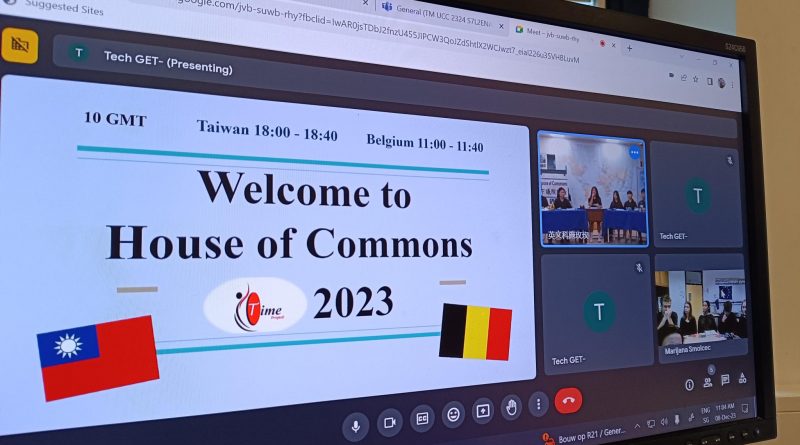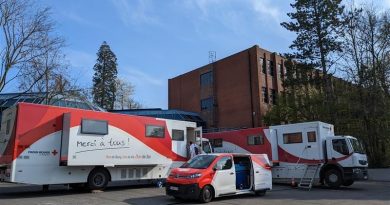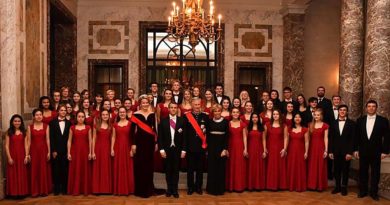The Time Project: a first at EEB1
Thanks to our teacher Ms. Marijana Smolcec, on the 8th of December 2023 our L2 English class took part in a very special project: the Time Project, a 24-hour online event for students worldwide, organized through the UNESCO Associated Schools Network. A wide variety of activities aimed at learning about other cultures was organized over the course of 24 hours. EEB1 was registered for two activities: a “Unite the Nation” quiz, where students answered questions created by students about their own country and a “House of Commons videoconference debate on Artificial Intelligence, where different schools argue about recent topics, often controversial; this time the topic was Artificial Intelligence. The debate presents as several statements on which the students give their opinion.
Our class was paired with students from a Taiwanese school, the “Affiliated High School of Chung-Hsing University,” in Taichung.
The few students who participate in the two activities proposed were very satisfied with the experience. So what makes the Time Project one of the most exciting initiatives in the school?

Firstly, it was a great opportunity to learn. For both of the activities, research was required from the participants.
Whether it was to answer the questions or create them, students were led to doing research about other countries. They researched more than 350 questions about Croatia, India, Pakistan, Malaysia, Taiwan, Hungary, Poland, Ukraine etc. The quiz was challenging; prepared by students for students.
For the debate, the students were pushed to think about their own opinion but also to do research in order to support their point of view with evidence. Should AI be used in school for fairer evaluation of a students’ abilities? Considering that AI now has the ability to provide high-quality teaching, should/could it one day replace human teachers? The Taiwanese students were particularly prepared: they had made a Powerpoint with their arguments for the reactions to each statement.
This allowed for the interventions from the two parties to be as constructive and thorough as possible, and for the participants to better understand what is at stake concerning the use of AI in our everyday life. Tymon Zajac (S7PLB), a participant from EEB1, recounts: “The preparation process sensibilized me on the challenges and risks of AI, how it influences daily life and how we become more and more used to it as an everyday tool.”
Additionally, the debate particularly allowed us to not only learn things for ourselves, but also to have contact with people that may have different points of view than us. The debate functioned with the concept of “agree” and “disagree”, signified by each person through a green or red sign to be held up after each statement is read aloud by the moderator. Once the signs have been held up and the moderator has seen what each person from the two sides thinks, they usually ask 2 people to speak: one in disagreement with the statement, and another that agrees. This is done whilst alternating between the schools as much as possible.
Whilst in general there was no drastic divergence in the opinions between the two schools, what was interesting to note was the divergence in opinion within the respective committees themselves: often some students were led to express opinions which did not match the majority opinion of their own school. In my opinion this was very interesting: as a school part of the European system and thus typically very diverse, we could still explore the differences within our own school. Additionally, and probably more importantly, we could also see that our correspondents, whom we would expect to have less diversity in opinion, experienced the same thing. In a way this showed that cultural difference is probably not the only factor which brings diversity in opinion in a context of this type: wherever we are, there are people from our own culture that may have completely different opinions. Difference in opinion doesn’t necessarily come from a different culture, as was seen when disagreement amongst the Taiwanese sometimes occurred. This seemed to be one of the most crucial points to learning from this type of encounter: remembering that one is different either way, no matter the culture.

It was also interesting to learn about the other party involved on a lighter note as well, beyond factual information and clashing opinions. At the end of the call, as all the statements had been used up we had a few minutes to ask some questions to the other party: what is Taiwan like? We learnt about some famous landmarks such as Taipei 101, the tallest building in the world, and the students mentioned Taiwanese delicacies like boba tea, which we immediately recognized, as it is also a very appreciated treat in Brussels! We mentioned waffles, chocolate, beer (most importantly), fries, etc…
Whilst this was a truly peculiar and enriching experience, with our school securing the 7th place amongst 23 schools participating. This was an amazing achievement considering it was our first year.
Yet we still felt there was even more potential to learn. From what Ms. Smolcec recounts, she once did a 24-hour debate and quiz marathon with her class back in Croatia, going on a call with as many as 10 foreign schools. I did think it was a pity that we did not do the same, with more calls. I believe this longer, more intensive format to provide even better opportunities to truly appreciate the experience to its full potential: learn as much as possible, and have even more fun! So why not here in EEB1? Maybe next year..?
Alma Bullier Giraud / S7FRD / EEB1 Uccle




